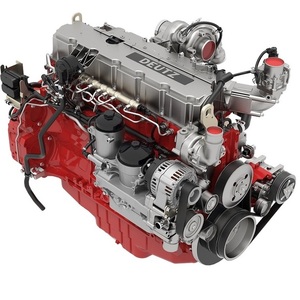Deutz approves engines for use of alternative fuels

Photo: Deutz AG
November 21, 2017
BY Deutz AG
Deutz has approved the latest generation of its entire TCD engine range for operation with alternative fuels. This will make a further significant reduction to the carbon footprint of combustion engines and even raises the prospect of running such engines on a carbon-neutral basis. For Deutz, this represents the next logical step in its efforts to develop sustainable and efficient drive systems. In combination with the electrification of its engine portfolio under the E-Deutz strategy, Deutz aims for the market leadership in the field of innovative drivetrains.
Sole use of electric motors is already a viable option in the low power output range, but for medium- and heavy-duty applications, for example involving construction equipment or tractors, there is as yet no suitable replacement for the combustion engine as the primary source of power. While electrification can improve efficiency as part of a hybrid system and allows for a downsizing of the combustion engine, there is still considerable potential for improving the ecofriendliness of conventional engines by choosing different fuels.
Deutz has now approved the engine series TCD 2.9 / 3.6 / 4.1 / 6.1 / 7.8 / 12.0 / 16.0 under the current EU Stage IV / U.S. Tier 4 standard, as well as all older Deutz engines without exhaust aftertreatment, for operation with paraffinic diesel fuels and biodiesel or biodiesel blends. The term paraffinic diesel fuel encompasses a wide range of products.
Advertisement
Advertisement
HVOs (hydrogenated vegetable oils), in particular, are currently being produced at commercial scale from sustainable plant oils and waste fats. In the future, ‘e-fuels’ will also become part of the mix that will enable engines to operate on an ecofriendly, carbon-neutral basis using renewable energy. The underlying principle is that in the production process the same amount of CO2 is taken out as is emitted by the combustion process. Because of its chemical composition, synthetic diesel fuel produced by this method can be mixed and used with fossil-based diesel in any ratio. ‘E-fuels’ and the E-Deutz strategy are a perfect fit. Deutz is driving forward both technologies with the aim of minimizing its carbon footprint.
The idea behind using biodiesel is also to cut CO2 emissions. In Europe, biodiesel is primarily based on sustainably and locally produced vegetable oils and waste fats. The approval covers 100 percent biodiesel for EU Stage IV as well as biodiesel blends, i.e. blended fuels containing biodiesel, for EU Stage IV and U.S. Tier 4 engines.
Advertisement
Advertisement
End customers utilizing alternative fuels benefit not only from the knowledge that they are helping the environment but also from tax advantages, which vary from region to region. In Germany and Austria, for example, biodiesel is exempt from tax when it is used for agricultural purposes, which lowers farmers’ overall running costs.
“For us as an engine manufacturer, alternative fuels are a key component in our innovative drive system mix,” said Markus Schwaderlapp, head of research and development at Deutz AG. “We believe that e-fuels offer a lot of potential for running combustion engines on a carbon-neutral basis. We are therefore looking to combine the benefits of combustion engines—robustness, mobility and flexibility—with those offered by electric drives.”
This fuel approval formed part of technical circular ‘Fuels 0199-99-01218/4’.
Related Stories
Global digital shipbuilder Incat Crowther announced on June 11 the company has been commissioned by Los Angeles operator Catalina Express to design a new low-emission, renewable diesel-powered passenger ferry.
ATR and French SAF aggregator ATOBA Energy on June 19 signed a memorandum of understanding (MOU) to explore ways to facilitate and accelerate sustainable aviation fuel (SAF) adoption for ATR operators.
Argent Fuels, a leading provider of carbon-saving fuels in the UK, is accelerating its efforts to support a greener future. The expansion of its High Blend Biodiesel will supply to bus, coach, HGV fleets and rail in the south of the UK.
Sprague Operating Resources LLC on June 24 announced it has been selected by the New York City Department of Citywide Administrative Services to supply renewable diesel for its marine fleet, including the iconic Staten Island Ferry.
On June 17, the NYC Department of Citywide Administrative Services and the Department of Transportation announced the start of the Staten Island Ferry’s transition to renewable diesel, marked by the delivery of the first barge of fuel.
Upcoming Events










